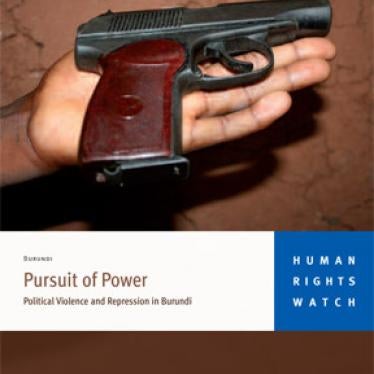(Bujumbura) - The government of Burundi should take urgent measures to end politically motivated killings, assaults, and arbitrary arrests, Human Rights Watch said in a report released today. Political violence and repression - which continue despite progress in peace talks between the government and the former rebel group, Forces of National Liberation (FNL) - limit peaceful dissent and threaten the integrity of presidential, parliamentary, and local elections scheduled for 2010.
The 86-page report, "Pursuit of Power: Political Violence and Repression in Burundi," details cases in which both the FNL and the government, dominated by the ruling National Council for the Defense of Democracy-Forces for the Defense of Democracy (Conseil National pour la Défense de la Démocratie-Forces pour la Défense de la Démocratie, CNDD-FDD), have used political violence and intimidation against opponents and dissenting voices in their own ranks.
"The ruling party and the former FNL rebels have been all too ready to commit abuses to intimidate their political rivals and assert power," said Georgette Gagnon, Africa director at Human Rights Watch. "But this is not the road either to meaningful elections or to a decent future for Burundi's people."
The report documents 23 killings, as well as a dozen non-fatal shootings and grenade attacks, carried out between January 2008 and April 2009 in the context of local-level apparent score-settling between FNL members and those affiliated with CNDD-FDD, including some police, administrative officials, and national intelligence service agents. It also documents more than 120 arrests since mid-2008, apparently on the basis of political affiliation, by police and administrative officials.
Most victims live in remote rural or marginalized urban areas. Virtually no one has been prosecuted for the abuses, in spite of the government's professed commitment to human rights when it took power in 2005, as well as statements by the FNL, in the course of peace talks, that it would cooperate with judicial investigations or prosecutions.
Human Rights Watch called on international donors and diplomats involved in the country's peace process and preparation for elections to press for an end to the attacks and for prosecution of suspected attackers from all sides.
Human Rights Watch found that the FNL's recent disarmament and transition from rebel movement to political party is unlikely to end human rights abuses linked to the struggle for political dominance, given that FNL and other opposition members have been the targets of state agents and ruling party activists, even in times of relative peace. At the height of peace talks in April, for example, as the FNL was preparing to disarm, government intelligence agents killed Emmanuel Minyurano, a local elected official belonging to the Democratic Front in Burundi (Front pour la Démocratie au Burundi, FRODEBU), who was also an active FNL supporter.
There have been mass arbitrary arrests of members of other political parties as well, such as the Union for Peace and Development (UPD-Zigamibanga) and the Movement for Solidarity and Democracy (MSD). The government has also taken other steps to suppress political dissent, expelling 22 opposition members from parliament in June 2008 and banning some opposition party meetings.
The FNL also committed abuses. Human Rights Watch's research shows that in 2007, the FNL violated a ceasefire agreement and international humanitarian law when it tried to tighten control over its own members by attacking camps occupied by unarmed dissident members who had left their movement. More recently, in January and February 2009, Human Rights Watch research indicated that FNL members killed one of their own activists, Abraham Ngendakumana, and abducted and tortured another, Jean Baptiste Nsabimana, after the two openly disagreed with decisions the FNL had made in the peace process.
Symbolic violence, such as destroying the property of other political parties, which in Burundi has often been a precursor to more serious violence, is widespread. Since December 2008, unidentified attackers have burned down more than 50 meeting places of the ruling party in at least 10 provinces. Partly in response to these events, members of the party's youth league, Imbonerakure, have begun marching through the streets before dawn in certain communes, armed with sticks and clubs, and chanting slogans, including death threats intended to intimidate their political opponents.
The focus by international donors and other stakeholders on establishing a formal peace has meant they have not sufficiently paid attention to dynamics of local political violence in Burundi, including the lack of accountability. Human Rights Watch has found that international diplomats, although criticizing some politically motivated arrests, could be much more active in defending the civil and political rights of politicians in Burundi who have been subject to both arbitrary arrests and expulsion from Parliament because of their views. The UN mission in Burundi, which has played a major role in the peace process, has carefully documented human rights abuses in private, but has failed to denounce abuses publicly.
Human Rights Watch called on the government of Burundi to stop political violence, to start on the path to accountability by investigating and prosecuting the 23 killings and other crimes documented in the report, and to take immediate steps to organize free and fair elections in 2010. The FNL should demonstrate its commitment to being a peaceful political party by ending abuses against both its own members and CNDD-FDD supporters, and by cooperating with police and prosecutors in investigations of crimes by FNL members.
"Killings, arrests, and other forms of repression have meant that Burundians live in fear of the consequences of expressing their political opinions," Gagnon said. "Their rights are at risk as long as both the ruling party and former rebel group face no consequences for their actions."







